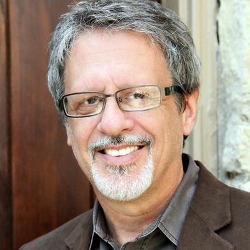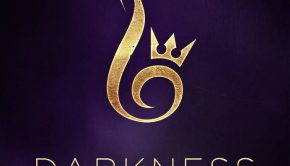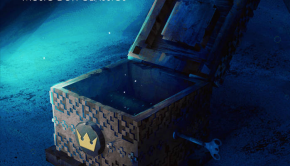Michael Salvatori Profile
 |
Also Known As: N/A |
| Date of Birth: 1954 (USA) |
|
| Residence: Bellevue, Washington |
|
| Game Works: Halo, Myth, Guilty Party, Destiny |
|
| Official Site: English Site |
History
| Organisation | Type | Tenure | Role |
| TotalAudio | Music Production | 1982 – | Co-Founder, Manager, Composer, Sound Designer |
| Bungie | Game Developer | 2011 – | Composer |
Biography
Composer and sound designer Michael Salvatori is best known for his collaborations with Martin O’Donnell on Bungie Studios’ Myth and Halo series. Born in 1954, Salvatori was first inspired by music when he saw The Beatles on television as a child. He recollects that on “seeing the guys playing guitars, with girls screaming at them, I realized that’s what I want to do”. While in university during the 1970s, Salvatori wrote music for his own progressive rock band and met O’Donnell, then a member of a rival band. After graduating, Salvatori established a recording studio to pursue a career as an electronic musician. He was eventually contacted once more by O’Donnell, who needed access to a studio to compose a film score. The pair decided to go into partnership for this project, splitting the profits between them, and went on to establish the music production company TotalAudio, Inc. in Chicago. The pair spent most of their time writing jingles for radio and television commercials, writing iconic jingles such as 1985’s Flintstones Chewable Vitamins together.
After over a decade concentrating on music for commercials, Salvatori broke into the video games industry by chance in 1986, when his partner was asked to create the sound design for Riven: The Sequel to Myst. Their numerous ambient sound effects enhanced the atmosphere of the game and helped to immerse players into the experience. Under the lead of Paul Heitsch, the duo went on to write music and sound effects for Bungie Studios’ Myth: The Fallen Lords and Myth II: Soulblighter. The resultant scores added gravity to the franchise’s epic stories with their dark and mystical soundscapes, and the pair proudly self-published the soundtracks by forming an in-house record label. Salvatori continued to juggle such projects with non-game activities, for example writing original music and narration for an edition of The New Millenium World Atlas. Salvatori and O’Donnell went on to all aspects of the audio for the RPG Septerra Core: Legacy of the Creator, offering a minimalistic soundtrack, immersive sound design, and powerful voice acting. However, they faced enormous difficulties while working on the project as the TotalAudio studio burned down in January 1999 right in the middle of production.
In 1999, Salvatori took over the daily running and business management of TotalAudio after O’Donnell was appointed at full-time composer at Bungie Studios in Washington. He nevertheless continued to make major contributions to O’Donnell’s game projects, frist as an assistant composer and sound designer for the electronic score to Oni. His synergistic relationship with O’Donnell reached its apex with 2001’s Halo: Combat Evolved, a smash hit for the Xbox. Throughout the soundtrack, the pair blended orchestral, electronic, and choral components to create an epic main theme and plenty of action-packed highlights. Salvatori was also extensively involved in the implementation of the soundtrack, combining cutting-edge sampling with his own instrumental and choral performances. In the years thereafter, Salvatori returned to produce the even more ambitious soundtracks for Halo 2 and Halo 3. Having inspired millions of gamers, the Halo trilogy received best-selling soundtrack releases from Sumthing Else Music Works and were celebrated in orchestral concerts such as PLAY! A Video Game Symphony and Video Games Live across the world.
Salvatori has spent much of his career working as O’Donnell’s partner and has received far less popular attention than his partner over the years. Between his Halo work, he has nevertheless embraced the opportunity to write the entire soundtracks for several games by Wideload Games. Noticed for his Halo work, Salvatori was first hired by the company as the audio lead and sole composer of 2005’s Stubbs the Zombie in Rebel Without a Pulse, built with the Halo engine. The memorable soundtrack blended covers of classic 1950s rock and love songs, all performed by modern bands, with some original acoustic compositions for the action sequences. The composer also relished the opportunity to produce a quirky and light-hearted soundtrack for Hail to the Chimp a few years later. Also in demand as audio mixer, Salvatori cultivated a long-term relationship with the Chicago Symphony Orchestra and participated in their Beyond the Score programs.
Salvatori closed his time on the Halo franchise by co-composing the soundtracks for 2009’s Halo 3: ODST and 2010’s Halo: Reach, both of which were more personal and emotional than the original Halo trilogy. He joined the production of the former just two months before the score’s deadline and helped to complete the soundtrack in a whirlwind of activity, combining composition work at Chicago with recording sessions in Seattle. By contrast, he started work on the Halo: Reach earlier than his partner and pitched many stylistic and thematic ideas. Both projects were nevertheless the products of collaboration; through a combination of his own improvisational approach to music and O’Donnell’s more theoretical approaches, he feels that collaborating allows them to create better music than they ever could alone. In his own words, he helps to make O’Donnell’s music “more accessible”and O’Donnell helps to make his music “more interesting”. Nevertheless continuing to do some independent work, he reunited with Wideload Games to pen the soundtrack for Disney’s Guilty Party, matching the feel of the game with storybook style orchestrations and a musical-influenced theme song.
In November 2011, Salvatori joined Bungie Studios as a full-time employee to enable a closer collaboration with O’Donnell. He is currently writing the soundtrack for Destiny, a new big-budget shooter from Bungie and Activision, alongside Martin O’Donnell and Paul McCartney. While the idea of collaborating with McCartney actually came from manager Lev Chapelsky, it was a dream come true for Salvatori, as a lifelong Beatles fan. 50 minutes of epic, sprawling music from the soundtrack have already been recorded at Abbey Road Studios. The trio are additionally releasing a prequel project featuring a choral and symphonic suite dedicated to each of the planets, called Music of the Spheres, that has been recorded at Abbey Road Studios. As audio design lead, Salvatori will also be responsible for integrating wider aspects such as sound effects, ambient design, and voice recording into the game. Away from Bungie, Salvatori is happily married with four daughters.
References:
– Various Game & Album Credits
– VGMdb Discography
– Official Site (English)
– Company Site (English, Archived)
– Interviews with Martin O’Donnell
– Interview on Official Site (English)
– Interview with Game Informer (English, December 2013)
© Biography by Chris Greening (September 2008). Last updated on March 18, 2014. Do not republish without formal permission.
Posted on March 18, 2014 by Chris Greening. Last modified on March 21, 2014.














